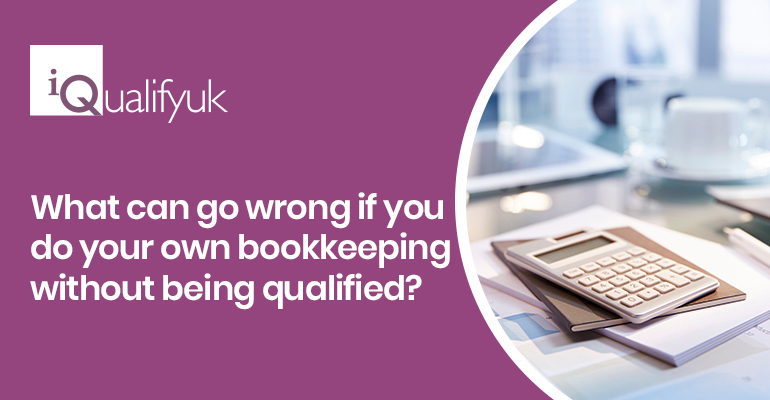What can go wrong if you do your own bookkeeping without being qualified?
September 7, 2023 2023-09-07 13:06What can go wrong if you do your own bookkeeping without being qualified?

What can go wrong if you do your own bookkeeping without being qualified?
The idea that an unqualified person can do their bookkeeping may appear odd, but people do it. The main reason they do it is to try and economise, because a qualified bookkeeper will undoubtedly cost more. The similarity between a qualified bookkeeper (the professional) and an unqualified one is that both have the basic knowledge of the practice. The difference is that the qualified one possesses extra knowledge in bookkeeping and has the expertise to do more. Bookkeeping by an unqualified person can cause problems.
Here are 5 things that can go wrong if a person does their own bookkeeping without being qualified.
1. Lack of professionalism
The membership bodies for bookkeeping help keep practising bookkeepers to remain updated on areas such as tax matters and payroll forms. Therefore, being unqualified means that one is not a professional bookkeeper and will therefore not receive continuous updates on bookkeeping matters. This can lead to violation of tax obligations and incorrect processing of payroll forms, cash flows and inventories.
2. Incompetence
In the UK, lack of accredited bookkeeping qualifications such as the IAB Bookkeeping Qualifications means that a person can only perform limited tasks in this context. Lack of such approvals means lack of recognition and respect of their work. In short, the bookkeeping they do might not be acceptable beyond their businesses or firms.
3. Errors
The techniques of bookkeeping keep changing from time to time. For instance, computerisation assists in simplifying the tabulation of figures and presenting reports. If a person does their bookkeeping without being qualified, he or she may not have the expertise to use bookkeeping software such as Sage and Quickbooks. This complicates the tabulation processes, and the chances of making errors during the recording of transactions and balancing books are very high. The wrong information would give an inaccurate picture of the financial health of the business, which in turn would lead to mistaken decisions.
4. Time Wastage
The unqualified bookkeeper, unlike the professional one, only has the basic skills of the practice. Therefore, their limited knowledge means they use either slower or outdated methods of bookkeeping. In the long run, the bookkeeping process ends up consuming more time than it would cost a qualified professional. In short, precious time goes to waste.
5. Expensive
The unqualified bookkeeper lacks not only the expertise but also the necessary equipment and software to do the tasks. Therefore, when such persons decide to do their bookkeeping, they may have to purchase or hire the needed aids. In addition, they may have to pay the professionals to assist them in using the equipment or software. In the end, more money is spent on simple bookkeeping jobs.
The bookkeeping industry is very demanding, and that means competence, respect, adherence to professionalism, accuracy, time management and cost-friendliness are important. However, it is evident that all of these may be lacking if someone decides to do their own bookkeeping without being qualified. Thus having an IAB bookkeeping qualification is crucial in preventing errors, achieving competence, and saving both time and money.
Recent Posts
- iQualify UK is excited to announce our recent accreditation with Pearson
- iQualify UK honoured with Queen’s Award for Enterprise: International Trade
- How is Leadership Related to Management in a Contemporary Business Environment?
- How Do Barriers to Change Influence Leadership Decision-Making?
- How Does Change Impact on an Organisation’s Strategy and Operations?


